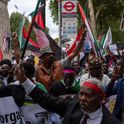Nelson Mandela with his predecessor Frederik de Klerk in 1992
JOHANNESBURG—They were singing freedom songs in Soweto this morning.
A common, mournful tune, sung in the Sesotho language, was among the more popular as dawn approached: “Nelson Mandela! Nelson Mandela! Ha hona ya tshwanang le ena! (No one compares to him!).”
Nelson Mandela, South Africa’s greatest and most famous son, had passed away peacefully at 8.50pm local time on Thursday, President Jacob Zuma announced. A hush fell over the nation, and then a cacophony of commentary and tributes poured in from world leaders around the globe. Speeches were made, and sadness shared, everywhere from Washington DC to London.
Outside Mandela’s family home in Johannesburg crowds gathered; tears covered every face—and smiles too.
South Africa mourns Mandela. On social networks, in the media, the outpouring of grief is huge—and it will only intensify over the next two weeks. With it, however, is an immense pride that a human being of the stature of Mandela lived here, walked among us and led us. As South Africa prepares to celebrate 20 years of democracy, the ideas and person of this great man are omnipresent.
When we speak of the “Rainbow Nation” that South Africa has become, it is him we credit with its creation. When we speak of the institutions of democracy that now stand at the centre of our nation and its politics, it is Mandela’s vision and name that epitomises them.
In a country that was divided by 46 years of apartheid until 1994, this morning black and white sang together outside Mandela’s home in Houghton, Johannesburg. Over the past year, as he was frequently hospitalised, and as South Africa’s political atmosphere soured with the elections scheduled for 2014 looming ever nearer, Nelson Mandela always managed to bring South Africans together. This morning, in the harsh light of a world without him, he still unites us. As I write, at 2.38am, it feels as if everyone I know is up and calling each other, tweeting, touching, mourning. Celebrating.
These scenes of celebration that we are seeing outside his house in sleepy, suburban Johannesburg; are being replicated in Soweto and other parts of the country.
Yet there are niggling questions. The key political debate that has haunted many has been the “After Mandela” question: what happens when the great man goes? What happens to the idea of reconciliation, of a united, non-racial and democratic South Africa? Many have speculated that this South Africa will disintegrate without the glue that is Mandela to hold it together.
Over the past few years, as South Africa’s economy has slowed precariously and racially-tinged rhetoric has increased, many commentators have ventured that the “honeymoon” is over. This, of course, ignores the fact that Nelson Mandela has been out of power for 14 years since he stepped down from the presidency in June 1999, and finally retreated from South African politics in 2002. Since then he has been virtually absent from the national discourse—except for a crucial intervention in the fight against HIV/Aids in the mid-2000s, after the disease claimed the life of his eldest son. Otherwise, apart from the impressive shadow he casts over us, he has had no real role in public life.
South Africa faces massive challenges today. Economic growth has slowed to an anaemic 2 per cent, youth unemployment is at 52.8 per cent, political rhetoric is on the rise—and a rowdy election campaign is underway. The current president, Jacob Zuma, is wracked by scandal—the latest being that his palatial homestead in his home village was built with £20m of taxpayers’ money under the guise of “security upgrades”.
Many also fear the rise of the expelled ANC youth firebrand Julius Malema, leader of the new Economic Freedom Fighters, who advocates Zimbabwe-style land grabs and mine nationalisation. Meanwhile, labour disputes are increasing and many remember the killings by police in August 2012 of 34 mine workers who demanded pay rises in a country counted as one of the six most unequal in the world.
These problems will persist after Mandela. Yet, to see his death as a possible trigger of collapse would be misplaced, for his contribution to South Africa was bigger than that. Mandela managed to demonstrate that even with these problems, South Africa is united by the need to build a new country that has broken with its race-divided past.
Over the next 10 days there will be nostalgia, mourning, weeping and the celebration of a great life, lived well. Then we will move on. The political scandals will return. An election will be held. The front pages will normalise back to their lurid diet of greed and scandal.
We are a country of warts most of the time, and of fierce magnificence sometimes. Mandela was us at our most magnificent. We shall bury him as he deserves, this great son of South Africa.
Then we will go back to being a troubled, struggling country that faced ruin in 1990, and was taught by one man and his comrades that it is possible to take the road less travelled and build something to inspire others at the end, warts and all.
That is why they were singing outside Mandela’s house this morning. They are still singing now, celebrating a great man whose legacy of reconciliation will out live many of us.












